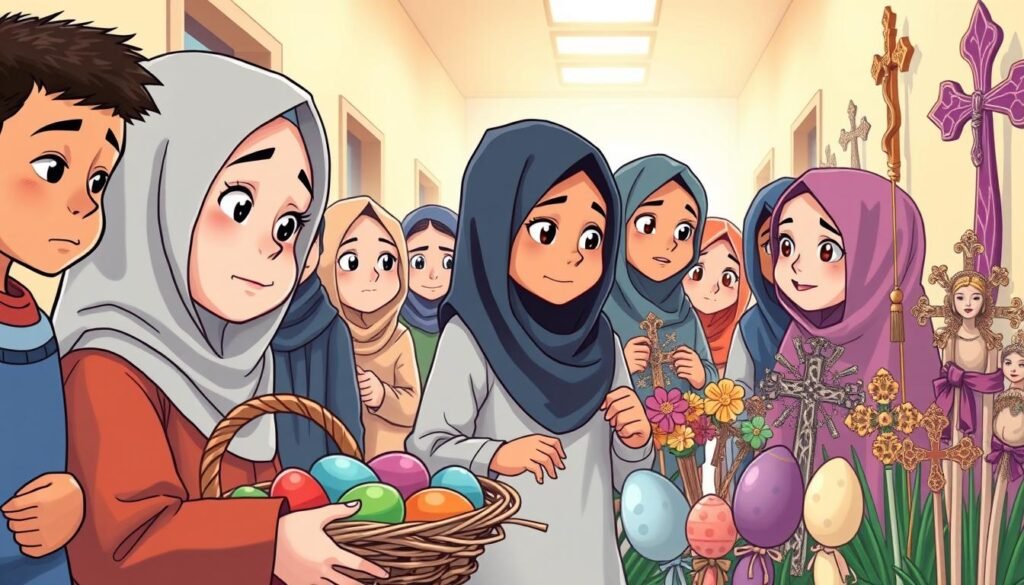Every spring, I see Easter decorations bloom in windows and streets. This sparks a question many of us grapple with: Can Muslims celebrate Easter—or is it a tradition best observed from a distance? As someone navigating faith in a multicultural world, this dilemma feels deeply personal. The Qur’an itself reminds us to seek wisdom in every story, so let’s explore how Islamic teachings shape our understanding of Easter’s significance.
The Qur’an tells us Jesus (Isa) was raised to God’s presence (4:157-158)—a belief that separates Islamic teachings from the Christian narrative of resurrection. Yet both traditions share reverence for his life. This tension between shared values and theological differences defines the Islamic view on Easter. For Muslims in America, where Easter eggs and spring celebrations are part of daily life, the question isn’t just theological—it’s about belonging and staying true to our roots.
Historical layers complicate things further. The Last Supper described in 5:112-115 mirrors themes of divine provision found in Passover and Easter feasts. But what happens when cultural practices clash with the Prophet’s warning against imitating non-believers’ rituals? This article doesn’t offer easy answers. Instead, it invites reflection: How do we honor our faith while respecting shared human traditions?
Understanding Easter from an Islamic Viewpoint
Looking at Easter from an Islamic view starts with its roots in ancient spring festivals. These festivals honored renewal. For Muslims, Easter’s religious symbols clash with teachings about Jesus (Isa) in the Quran. This section explains these differences while showing respect for both traditions’ reverence for Jesus.
“They did not kill him, nor crucify him, but it was made to appear to them.” — Quran 4:157
Origins of Easter in Christianity
Easter’s main story in Christianity is about resurrection. This idea is not found in the Islamic view of Jesus. Early Christians mixed pagan symbols like eggs and rabbits with the crucifixion story. This created a holiday with many different beliefs.
These changes are very different from the Quran’s accounts. The Quran says Jesus did not die on the cross.
Islamic Understanding of Jesus (Isa in Islam)
Isa in Islam is a prophet born of a miracle. His life was guided by divine purpose. The Quran talks about his virgin birth (Quran 19:16-21), his role as a sign for humanity, and his ascension to heaven (Quran 3:55).
Muslims believe Jesus was sinless but not divine. They see him as a mortal messenger, like Moses and Muhammad. His return before Judgment Day is also important, but his mission will follow Islamic law.
Theological Differences
The Quran denies the crucifixion and the Trinity. Easter celebrates resurrection, but Islamic teachings say Jesus was raised alive. This was to avoid martyrdom, as the Quran says (Quran 4:157).
These differences show why many Muslims see Easter as a cultural event. They need to carefully examine its theology.
Islamic Principles on Celebrating Non-Muslim Religious Holidays
Islamic teachings stress keeping a strong religious identity. This is through tawhid (oneness of God) and avoiding practices that weaken faith. Scholars point to Quranic verses like 98:5, warning against following others into error. The hadith also says:
Whoever imitates a people is one of them
Core Islamic rules on holidays ban adopting rituals from other religions. This includes Easter’s resurrection stories. Scholars agree that exchanging religious greetings or participating in unique rituals like Easter egg hunts are forbidden.
Yet, many scholars say it’s okay to join social gatherings for valid reasons. This could be for community outreach, without taking on the holiday’s religious meaning.
Traditional rules also ban customs like Christmas trees or Lent fasting. These customs show theological differences. But, cultural activities like spring festivals without religious meaning might be okay.
The Prophet’s companions kept friendly ties with Jews during their harvest festivals. They didn’t join their rituals. This balance lets Muslims be social while keeping their faith strong.
In today’s world, families face choices between cultural inclusion and sticking to their faith. By focusing on core beliefs, Muslims can respect their identity and build mutual respect. The Quran’s many mentions of Jesus as a prophet show respect for shared traditions without agreeing on all beliefs.
Can Muslims Celebrate Easter? Scholarly Opinions
Islamic scholars have different views on Easter. They discuss how to keep faith pure while being friendly with others. 
The hadith says, “Whoever imitates a people is one of them,”. This makes some worry about losing their faith in the mix.
Conservative Islamic Perspectives
Traditional scholars focus on keeping Islamic beliefs strong. They say we should not copy non-Muslim ways. The Standing Committee for Fatwa says no to Easter because of its beliefs.
All four main Islamic schools agree. They say we should not join in festivals that are key to other religions.
Moderate Viewpoints on Cultural Participation
Some modern scholars, like those at Al-Azhar, see things differently. They say it’s okay to be with family at Easter, as long as we don’t do things that are too religious. They think family is important, but so is keeping our faith.
One scholar said, “Sharing meals can help us connect without losing our faith.”
Contemporary Fatwa Considerations
Today’s fatwas on Easter are all about context. Scholars in North America say it’s about our intentions when we join in. While no one says we should make Easter rituals, most say it’s fine to join in culturally.
They aim to keep our faith strong while being open to others.
Distinguishing Between Religious and Cultural Aspects of Easter
As Muslims deal with Easter, it’s key to know the difference between Easter religious elements and cultural traditions. Islamic teachings tell us to stay away from things that go against tawhid, or the belief in one God. For example, taking part in rituals that say Christ is God or was resurrected goes against the Quran.
Islamic scholars say it’s best to avoid Easter masses or stories of crucifixion. But, things like egg hunts, spring decorations, or family gatherings might be okay if they don’t have religious meaning. The Prophet Muhammad showed us it’s okay to join in with others during festivals, as long as we don’t worship idols.
“The criterion is intent,” noted scholar Dr. Uthman Ali. “If Easter eggs symbolize renewal without religious connotations, they align with Islamic values of family joy.”
When deciding what to do, ask yourself: Does this honor Islamic teachings? Is it just for fun? Some Muslims choose to stay away, while others are more careful. In places like Iran and Turkey, people enjoy spring festivals that are fun for everyone, not just for one religion.
The Quran tells us to think carefully about what we do (39:18). By focusing on our intentions, Muslims can enjoy Easter’s cultural side while keeping their faith strong.
Muslim Families in American Easter-Celebrating Communities
For Muslim families in America, dealing with Easter in American culture is tricky. They must mix Islamic beliefs with joining in. Schools and neighborhoods often have Easter egg hunts, making kids feel left out.
“We explain that Easter honors a story we respect but don’t share,” says a Chicago mother, part of a growing number of families using the season to discuss Prophet Isa (Jesus) through Quranic teachings. “It’s a chance to highlight shared values like charity and gratitude,” she adds.
In some places, like the South, schools make Easter events more neutral. They have egg hunts without religious symbols. This makes it easier for kids to join in without feeling odd.
In New Jersey, schools often have shorter days on holidays. This helps families who choose not to participate. But, 90% of Americans celebrate Easter, making it hard for kids to resist the excitement.
Groups like the Ahmadiyya Muslim Community focus on education and helping others. They work with the Red Cross and food banks in the spring. This shows Islamic values of kindness and helping others, just like Easter.
At the end of the day, families find their own way to celebrate. They might have iftar-like gatherings or teach their neighbors about Islam. The main goal is to stay true to their faith without feeling alone.
Respecting Christian Neighbors While Maintaining Islamic Identity
Interfaith dialogue helps Muslim-Christian relations grow during special times like Easter and Ramadan. This April, a rare chance for both holidays to align offers a deep dive into understanding. Events like Chicago’s Interfaith Trolley Tour show how to build bridges without losing faith.
Such events are key to creating spaces where everyone can learn from each other.
“Christians have much in common with Muslims, but in the end, we must focus on the message of Easter.” This quote shows how to respect differences while seeking common ground in values like justice and compassion.
Building Interfaith Dialogue Around Holidays
Starting interfaith dialogue means being curious. Go to iftars or Easter services as an observer. The Ahmadiyya Muslim Community’s 35-city iftars are a great place to start.
Ask questions like, “How do you see Jesus’ teachings shaping your faith?” This way, we honor Muslim-Christian relations without forcing agreement.
Sharing Islamic Perspectives Respectfully
When talking about differences, say what you believe, not what everyone must think. For example, “We believe Jesus was a prophet, not divine—this shapes how we celebrate his legacy differently.”
Don’t be dismissive. Instead, focus on shared values like love and service. This approach follows the Prophet Muhammad’s example of respectful engagement.
Finding Common Ground in Shared Values
Look for universal values like family, charity, and justice. During Easter, talk about Islamic values like sacrifice and community support. The Quran teaches us to be kind, not pushy.
Values like justice, mercy, and peace help us connect without losing our Islamic identity.
Alternative Approaches for Muslim Parents During Easter Season
Many Muslim families face a big challenge during Easter. They look for ways to keep their kids busy without going against their faith. They find answers in alternative activities for Muslim children that match Islamic values.
For example, they might take family trips to parks. Or they could have craft sessions that celebrate spring. These can include planting seeds or decorating eggs with Quran verses.
Research shows that 60% of Muslims find cultural traditions like Easter’s spring symbolism acceptable when stripped of religious connotations.
Parents can also teach kids about Prophet Isa (Jesus) through Quran stories. They can join community events like iftar gatherings or charity drives. This helps kids connect with others without copying.
When schools have Easter events, parents can ask for secular crafts. Or they can choose service projects, like giving food to those in need. This teaches kids about kindness and sadaqah (charity).
Talking openly is important. Parents can say, “We celebrate spring in our own way.” This helps kids understand their faith without feeling left out. By focusing on values like kindness and happiness, families can show unity and respect.
Easter-Like Celebrations in Islamic Traditions
Islamic spring celebrations offer meaningful alternatives to Easter. Sham el-Nessim, celebrated in Egypt, marks spring with family picnics and traditional dishes like colored eggs. These customs, rooted in ancient traditions, align with the universal joy of new growth without religious implications.
Iran’s Nowruz ushers in spring with the Haft-Seen table, where decorated eggs symbolize fertility and hope. Such practices reflect Muslim holiday traditions that honor seasonal cycles while respecting theological boundaries.
Spring Celebrations in Muslim-Majority Countries
In Pakistan, Basant festivals feature kite-flying and vibrant attire, embodying spring’s vitality. These cultural practices highlight shared human joys—colorful decorations, communal feasts—without endorsing non-Islamic beliefs. Many scholars emphasize that such traditions align with celebrating creation’s beauty, as stated in Quran 2:29: “It is He who made you successors on the earth.”
Islamic Holidays That Celebrate Similar Themes
Eid al-Fitr, marking Ramadan’s end, shares themes of renewal through fasting and charity. Like Easter’s renewal symbolism, Eid’s feasts and gatherings emphasize community and gratitude. Scholars note that Islamic traditions already offer frameworks for celebrating life’s cycles—whether through spring’s blossoms or Eid’s communal joy. These examples show how Muslim holiday traditions provide rich alternatives that honor both faith and shared human experiences.
Navigating School and Workplace Easter Activities
Easter is becoming more visible in the U.S. Muslims in schools and workplaces face challenges. They want to participate but stay true to their faith. Schools and offices might have Easter events. How can Muslims join in without going against their beliefs?

Guidance for Muslim Students
Parents and teachers need to work together. Teachers can give different tasks during Easter lessons. For example, a student might draw flowers instead of religious symbols.
It’s important to talk openly. A mother in Texas says, “I tell teachers my child does seasonal crafts but not religious ones.” Schools can also plan field trips or exams during other times. This helps fasting students.
Professional Settings and Religious Accommodation
U.S. law requires employers to make workplace religious accommodation under Title VII. This means not forcing holiday events or flexible schedules. An employee might ask, “Can we move the Easter brunch to avoid prayer times?”
It’s also key to talk about food needs during office celebrations. Many companies now offer halal snacks or secular options. This shows respect for different beliefs.
These steps help everyone feel included. It’s about respecting each other’s beliefs. The aim is to celebrate together, showing America’s diversity.
Historical Examples of Muslim Interactions with Christian Holidays
Islamic history with Christianity shows times when Muslims interacted with Christian holidays. When Prophet Muhammad (peace be upon him) entered Mecca in 630 CE, he showed respect. He spared icons of Mary and Jesus, showing tolerance. This act set a good example for later Muslim-Christian historical relations.
In al-Andalus (Muslim Spain), from 711–1492 CE, Muslim rulers let Christians celebrate Easter and Christmas. The caliphs of Cordoba even allowed churches to have processions. But, they limited public calls to prayer. This showed a balance between Islamic identity and shared heritage.
The Ottoman Empire later followed a similar path. Non-Muslims could celebrate holidays privately, as long as they didn’t challenge Islamic authority.
Historical fatwas (legal opinions) show different views. Imam Al-Ghazali (d. 1111 CE) said Muslims should avoid joining non-Muslim festivals. But, he allowed cultural exchanges like gift-giving. These debates are similar to today’s talks on Easter participation.
For example, modern scholars like AboutIslam suggest avoiding theological symbols. But, they also say we should respect our neighbors’ traditions.
“History teaches us that coexistence is possible when principles guide engagement, not fear.”
These examples teach us that finding a balance between identity and coexistence is not new. By learning from our past, we can handle today’s challenges wisely.
Teaching Children About Different Faith Traditions
Talking about Easter with Muslim kids needs care and respect. Start by saying how Muslims see Jesus—Isa—as a prophet, like Christians do. A parent in Florida shared how naming kids Isa and Mariam opened talks on shared beliefs.
This way, curiosity turns into learning about what we all share.
Age-Appropriate Explanations of Easter
Explain Easter’s meaning without agreeing on all points. Say Christians believe in Jesus’ resurrection, as 1 Corinthians 15:3–8 says. Then, compare it to Eid al-Fitr, where Muslims celebrate Ramadan’s end with family.
This shows how holidays bring people together through values like gratitude and family.
Reinforcing Islamic Identity While Respecting Others
Use examples like an Australian family in China who celebrated spring’s renewal. Talk about Eid traditions and others’ ways. Encourage asking questions, like why some burn iPhones during Tomb Sweeping Day.
This shows how traditions change around the world.
Teaching about different faiths means explaining beliefs without judging. When a Buddhist friend didn’t want to go to church, it taught us to respect choices. Schools in New York and Florida now talk about these topics, creating a safe space for discussion.
By sharing such stories, we raise kids who respect their faith and others’ paths.
FAQ
Can Muslims participate in Easter celebrations?
What are the key theological differences between Islam and Christianity regarding Jesus?
What is the concept of tawhid and how does it relate to participating in non-Muslim holidays?
How do contemporary fatwas address Muslim participation in Easter celebrations?
What specific religious elements should Muslims avoid during Easter?
How can Muslim families navigate social pressures during Easter in predominantly Christian communities?
What are some constructive ways for Muslims to engage with their Christian neighbors during Easter?
Are there alternative activities Muslim parents can offer their children during the Easter season?
What historical examples illustrate Muslim interactions with Christian celebrations?
How can Muslim parents explain Easter to their children in an age-appropriate manner?

Embracing Faith, One Insight at a Time!
The teachings of the Quran have always guided my path. With a deep passion for Islamic knowledge, I strive to blend the wisdom of tradition with the relevance of today, making the timeless messages of Islam accessible and meaningful for everyone.
Muslim Culture Hub is my platform to share historical insights and thought-provoking articles, exploring both well-known and lesser-discussed aspects of Islamic culture and beliefs. My mission is to create an inclusive online space where everyone can learn, strengthen their faith, and connect with the profound message of Islam.
Join the journey!
May peace be upon you.








